AUCD 2023 Conference: Emerging Leaders Shaping the Future
In November, NH-ME LEND joined experts from across the disability field at the Association of University Centers on Disabilities (AUCD) Annual Conference, in Washington D.C. to share with and learn from emerging leaders who represent the next generation of innovative clinicians, service providers, trainers, advocates, family members, and academic professionals. Our program was well represented at the conference poster session with presentations by our recent LEND alums (2023) and faculty from both states.
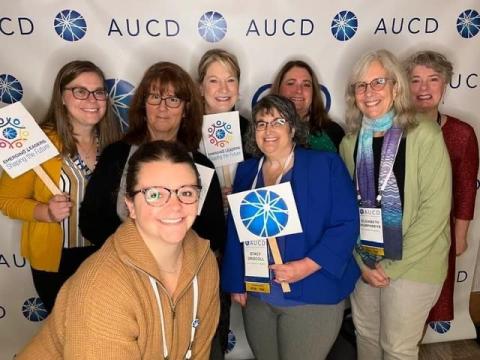
NH-ME LEND faculty and 2023 Alums at the AUCD Emerging Leaders conference
Micaela Demeter presented her poster, “Empowering Families to Choose a Pathway to Services After an Autism Diagnosis.” In collaboration with the Child Development Clinic at Amoskeag Health in Manchester New Hampshire, she developed an infographic to be shared with families just after receiving an autism diagnosis for their young child. With a goal of empowering families to ask the right questions and make informed decisions, this infographic outlines service options, briefly describes how therapies may address their child needs, and provides connections to supports and services which match their family priorities.
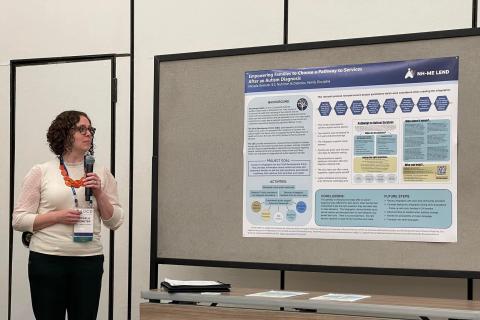
Micaela Demeter presenting her poster
The poster, “Reducing Barriers to Civic Engagement for People with Disabilities” was presented by Victoria Muñoz. During her work with the NH Council on Developmental Disabilities she explored barriers to civic engagement for people with disabilities and worked with the NHDDC to support New Hampshire state bills allowing for remote and hybrid participation in government meetings. Victoria’s work also emphasized the inclusion of people who identify as having disabilities in government leadership positions.
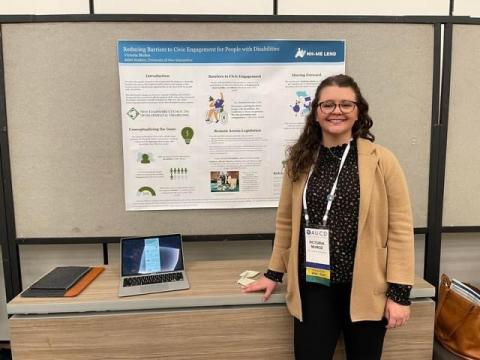
Victoria Munoz with her AUCD poster
Michelle Fong’s poster, “Mind the Gap! Data Equity to Improve Population Health Equity for People with Disabilities” examined the drivers of data gaps for people with disabilities (PWD) and described a framework for ensuring equitable representation in public health data for PWD. Together with the Center for Community Inclusion and Disability Studies (CCIDS) at the University of Maine, twelve recommendations were formulated in two general areas: achieving congruency of states’ data laws and shifting mindsets around the collection and reporting of health data for PWD. The collection and reporting of public health data that represent health outcomes, voices, and experiences of PWD are essential to driving down health disparities, an ethically, legally, and fiscally sound goal.
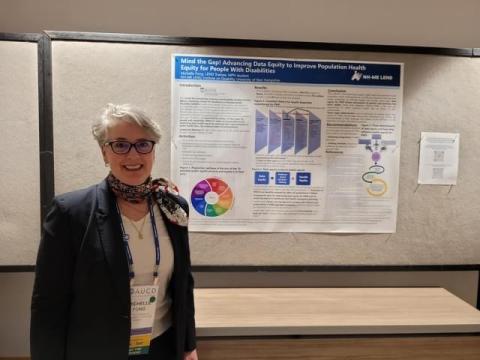
Michelle Fong and her AUCD Poster
Faculty members, Kathy Bates, Marnie Morneault, and Susan Zimmerman presented “Advancing a Universally Designed (UD) Curriculum: How NH-ME LEND is Creating an Accessible Program for ALL”. The poster represented a faculty workgroup convened in 2021 to consider how best to recruit and support trainees and faculty with disabilities. The focus of the group evolved to incorporating Universal Design for Learning (UDL) principles into the curriculum as an effective approach to accommodate the wide range of learning styles of all NH-ME LEND trainees, not just self-advocates.
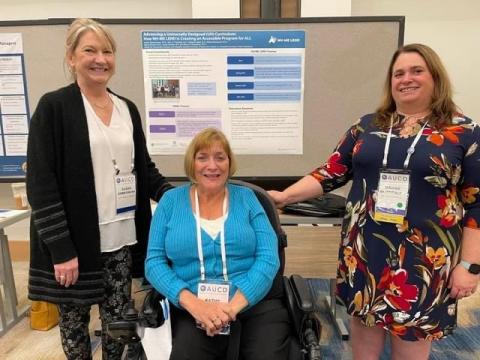
LEND faculty (L-R) Susan Zimmerman, Kathy Bates, and Marnie Morneault in front of their poster
The trip to D.C. wrapped up with trainees and faculty from the Institute on Disability and The Center for Community Inclusion and Disability Studies visiting New Hampshire and Maine Congressional delegations on Capitol Hill. Hill visits focused on raising awareness of disability-related issues in both states and educating members on the importance of positive change for people with disabilities and their families.